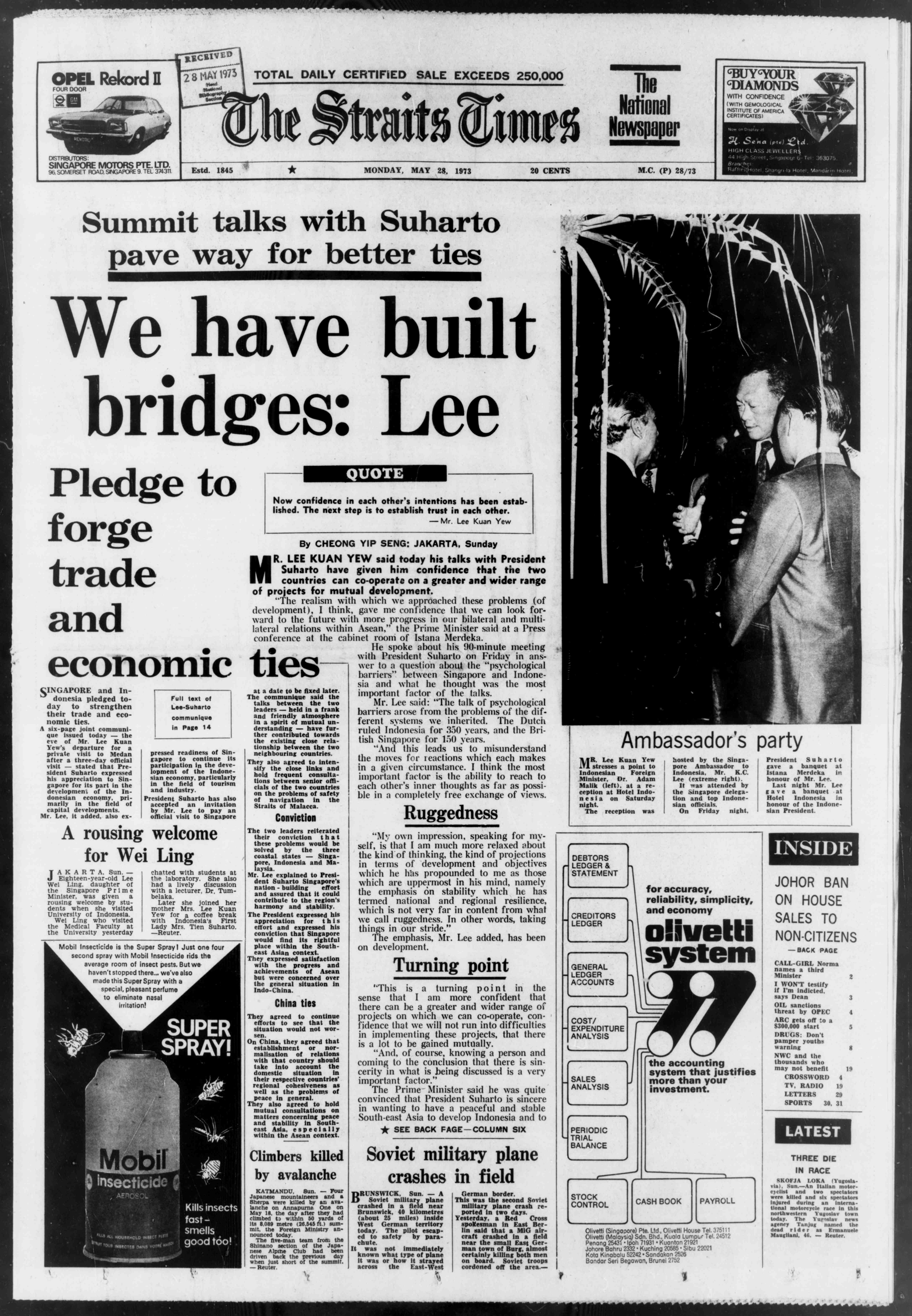LIVING HISTORY
A bitter pill
DANGEROUS TIMES: KRONFRONTASI
Sign up now: Get ST's newsletters delivered to your inbox
The March 10, 1965 incident was the deadliest in Indonesia's Konfrontasi campaign, and remains post-war Singapore's most serious bomb attack. Some 25 pounds (11kg) of explosives had been used in the blast that killed three people and injured 33.
"I remember vividly the whole place was cordoned off when the reporters arrived, so we could only observe what was going on outside the cordon that was thrown by the police around the building," said Mr Cheong. "Cars could not go through. We were hanging around Orchard Road by the road divider. There was shattered glass all over the place... it was drizzling."
The damage was extensive - lift doors and toilet doors were ripped off, the inner walls collapsed and rubble rained down on employees.
The blast was of such force that it shattered the windows of buildings within a 100m radius.
The culprits, Indonesian marine commandos Osman Mohamed Ali, 23, and Harun Said, 21, were caught at sea three days later. They were convicted of murder and sentenced to death. Indonesia appealed for mercy but the Singapore Government refused. On Oct 17, 1968, both men were hanged.

Mr Cheong remembered the tensions escalating as Singapore stood firm in the face of pressure from Indonesia. He said: "If you allowed two murderers to go scot-free, even though the Indonesian president sent a special envoy to plead for their lives, can you imagine what a terrible blow it would be to our judicial system, our system of justice? How can you free two murderers who killed three people?''
Public anger mounted in Indonesia. About 400 students raided the Singapore embassy in Jakarta and embassy staff had to be evacuated. When the bodies of the two marines were flown back, they were buried with military honours. Hundreds of thousands joined their funeral procession which extended at least 8km.
FLOWERS AT THE GRAVE
Tensions simmered until Mr Lee Kuan Yew, then Prime Minister, made his first official visit to Indonesia in May 1973, at the invitation of President Suharto, who had by then shed his general's uniform.
Before the three-day visit, Indonesian newspapers wrote about the mutual mistrust and "psychological barriers" between the two countries.
Mr Lee visited the Kalibata National Heroes Cemetery to lay a wreath for six Indonesian generals killed in an abortive coup that had paved the way for the Suharto presidency.
Another gesture was to come.
Mr Cheong, who had travelled to Jakarta to cover the visit, watched in surprise as Mr Lee stopped to scatter flowers over the graves of the two men who had bombed MacDonald House eight years earlier.
In Indonesia, the duo were seen as heroes who were killed while carrying out a state-sanctioned mission. The country needed to see Singapore's leader make a gesture that, in Javanese belief, propitiated their souls.
"If LKY had not 'made amends' through the sprinkling of flowers, it would not have been possible to turn the corner fully," Mr Cheong said. "He had to swallow the bitter pill for the sake of a new chapter in bilateral relations. That gesture, that act of contrition, if you like, made a big difference to bilateral relations."
As a reporter, Mr Cheong would not witness a more historic occasion.
"The tone completely changed from cold hostility to one where both sides decided that we better be pragmatic about the future, be pragmatic about how we should conduct bilateral relations. We've got to look forward, we can't keep looking back."
Mr Cheong chose not to lead his story that night with PM Lee's graveside gesture, focusing instead on the overall improvement in the relations.
During Konfrontasi, media reports from Jakarta were hawkish and shrill.
But The Straits Times had steered clear of rhetoric. "It helped to lower the temperature," said Mr Cheong, although he maintained that it would "attach too much importance" to the newspaper to say its tone helped ease tensions.
But he added: "I suppose you cannot deny that The Straits Times did make a small contribution." • ST
1979
BY-ELECTIONS
By-elections are held. Mr Lee Kuan Yew criticises The Straits Times at the traditional chap goh mei party at the end of the Chinese New Year for treating the elections like a "cockfight".
The Prime Minister further states at a meeting with senior and middle-grade journalists a month later that the paper's English-speaking journalists lack a grasp of realities on the ground and that the paper needs to attract more graduates with training and better salaries.
1981
NOMINEE
Mr J.B. Jeyaretnam, the leader of the Workers' Party, wins a by-election in the Anson constituency. He emerges as the first opposition member in parliament in 13 years. The Prime Minister largely blames the loss of a seat on The Straits Times' election coverage, which had included reports of an impending hike in bus fares.
Fears of direct intervention by the government in the operations of The Straits Times prompt the management to request an interview with Mr Lee. It is eventually agreed that a government nominee approved by the company will be made executive chairman of The Straits Times.
The company suggests that Mr S.R. Nathan, then a top civil servant on the verge of retirement, take on the role of executive chairman.


